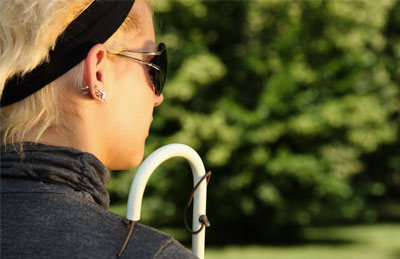Workplace Domestic Violence: Supporting Workers with Disabilities
In Ontario, Neighbours, Friends & Families (NFF) has been a clear voice for public education on addressing domestic violence since 2005. NFF materials are designed to prepare neighbours, friends and family members, as the people who are closest to women who are experiencing abuse, as ‘bystanders’. NFF teaches everyone to recognize warning signs and risk factors, to respond safely and effectively and to know where to refer for help in the community. Since the launch of NFF there have been many important milestones and innovations. One of these was the collaborative work to develop a disability strategy to better support women with disabilities (WWD) and Deaf women who are experiencing abuse in their relationships.
The NFF Disability Strategy was developed through the collaborative work of an advisory group that listened carefully to the experiences of women. The strategy was launched in 2011. The content remains relevant and important. 60 percent of women with disabilities experience violence of some type during their lifetime.[1] When disability intersects with race, culture, class, religion and ethnicity the complexity is compounded, making vulnerable women even more vulnerable.
“Talk about every culture, race, talk about intersectionality. Our needs cross everything.”
Study participant
The NFF Disability Advisory Committee strongly recommends using an intersectional lens during the development of resources and responses. “Individuals have complex identities and we belong to multiple communities simultaneously. During the interviews for the report, women spoke about the overlapping social locations they occupy. “We can experience discrimination and exclusion in for multiple reasons and in multiple ways. Racialized women with a disability may face different challenges and barriers than non-racialized women with disabilities.” Disability crosses all strata of Canadian society and as Canadian society becomes more diverse, an ever deepening understanding of the many faces of abuse is needed.
Key messages for bystanders focus on the importance of counteracting the deep set myths and biases that the disabled members of society face every day, as well as practical advice and information.
- Neighbours, friends, family members and co-workers need to be able to see women with disabilities as both competent and relational human beings. Discomfort and denial of the idea that women with disabilities and Deaf women have intimate relationships must be addressed.
- Bystanders need to understand the elevated risk for women with disabilities and Deaf women to experience abuse.
- Ask questions in a dignified way, without compromising rights to confidentiality and autonomous decision making
- Women with disabilities may have unique warning signs. These could include things such as a not having access to assistive devices that she relies upon, missing medical or rehabilitative appointments, an unexpected or unexplained deterioration in over-all health or an aggravation of an existing disability.
- Women with disabilities are not only at risk from intimate partners, but also from family members and caregivers that they may rely on for support. Talk about how to support a woman who is experiencing abuse from her family or care giver.
- Women with disabilities and Deaf women may benefit from support of disability support groups as well as from traditional violence against women services in order to safely leave an abusive relationship and continue to live independently from the person who is abusing them.
- Resources should be designed so that information about regional or local services, such as accessible places to go if you are leaving an abusive situation can be listed.
The strategy articulates the need to build relationships with disability communities, to learn from each other, to collaborate and to create new initiatives to prevent and respond to violence against women with disabilities and Deaf women. One of the key messages of NFF is that everyone has a role to play in ending violence against women. To be meaningful, it has to include everyone. The NFF Disability Strategy is an important resource that supports more inclusive contributions.
NFF is managed by the Centre for Research and Education on Violence Against women and Children at Western University. The Ontario Government generously provides funding to provide hard copy NFF brochures free of charge. To order:
[1] Canadian Women’s Foundation: http://www.cdnwomen.org/EN/section05/3_5_1_1-violence_facts.html
